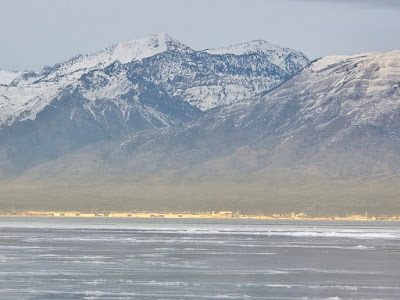It is written: Thou shalt not kill, nor do anything like unto it
If I were a snowflake
I’d do my best to fall into the lake
I don’t trust my melted body would make it otherwise
It is written: Thou shalt thank the Lord thy God in all things
Have you ever faced something much bigger and stronger than you
That is somehow completely at your mercy?
Horses. Backhoes. Whales. Lakes. It creeps me out.
It is written: The fulness of the Earth is yours
We live in the wet shadow of the flattest sea
Almost indifferent to the moon
Her tide rises with the snow and falls with the sun
It is written: For benefit and use
That shallow breathing humidifies our home, frosts our mountains
A misty oasis for life that can survive nowhere else
Refugees with two legs, four legs, six, eight, twenty-two
It is written: To please the eye
A trickster’s trickster
She makes saltwater from freshwater
Squeezed from twenty-two thousand square miles of dry land
It is written: To gladden the heart
We call her one body, but she is seven at least
Our own Fitcher’s Bird
Her severed arms each a different color and salinity
It is written: With judgment
She uses the artificial fingers we have carved from her flesh
To cradle five million eggs and fifty trillion cysts
In our generosity, we leave twenty-two cysts per liter
It is written: Not to excess
She harnesses our violence to preserve life
Unnaturally fresh, unnaturally salty
Unnaturally high, unnaturally low
It is written: Neither by extortion
We use one million acre-feet too much water each year
Just over one cubic kilometer
One billion tons or one Utah Lake too much
It is written: Trouble me no more
Neglect is harder to cure than malice
Indifference is harder to uproot than ignorance
Is overuse a dominant gene?
It is written: Doth man offend God?
She can vanish and reappear
A century-long reset to sweep the watershed of ditches and dikes
Her breath laced with ashes instead of living steam
It is written: Do the works of righteousness
What does it mean to save the one who gave you life?
What does it mean to fail to save the one who gave you life?
There is a Utah Lake’s worth of water to be had
It is written: You shall receive your reward
From Sego lilies to potatoes to alfalfa to turfgrass
What are we sowing?
What will we reap?
It is written: Even peace in this world, and eternal life in the world to come
In a basket, in a handcart
In a resolution, in a bill
In a newsletter, in a poetry reading on a hill
We will gather up her parts
and our own
Poem by Ben Abbott read at the 3rd annual Songs Scored by Shorelines: the Irreplaceable Poetry Reading on March 22nd, 2025










































